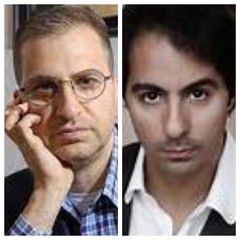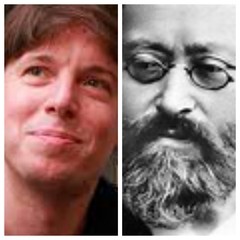|
Back
Notes of Joy and Despair New York
Stern Auditorium, Carnegie Hall
03/18/2022 -
“The Annual Isaac Stern Memorial Concert”:
Joseph Haydn; Symphony No. 59 in A Major (“Fire”)
Max Bruch: Violin Concert No. 1 in G Minor, Opus 26
Karim Al-Zand: Luctus Profugis (New York premiere)
Ludwig van Beethoven: Symphony No. 1 in C Major, Opus 21
Joshua Bell (Violin)
Galilee Chamber Orchestra, Saleem Ashkar (Music Director and Conductor)

K. Al-Zand/S. Ashkar (© Profiles.rice.edu/Liudmila Jeremis)
“And the night shall be filled with music,/And the cares that infest the day/Shall fold their tent like the Arabs/And as silently steal away.”
Henry Wadsworth Longfellow, from The Day Is Done
“What they (Galilee Chamber Orchestra) have accomplished is something incredible.”
Joshua Bell last night, after playing the Bruch Concerto
Joshua Bell’s adjective “incredible” is appropriate, though the Galilee Chamber Orchestra is not the first ensemble to bring together Arab and Jewish musicians. Daniel Barenboim in 1999, had assembled musicians from Egypt, Iran, Israel, Jordan, Palestine and Syria for the “West-East Divan Orchestra.” Conductor Saleem Ashkar had more modest aims, bringing together, in 2012, young artists from Israel only.
I had known Mr. Ashkar mainly as an international virtuoso pianist. Yet he has shaped these 35 musicians–half Arab, half Jewish–into a group which responded with alacrity to his baton‑less conducting.
Admittedly, having heard both the Vienna Philharmonic and Boston Symphony this month at Carnegie Hall, my expectations for the Galilee Chamber Orchestra were not for a world‑class ensemble. But to their credit, the program was difficult, some of the players were wonderful, and two of the four works were outstanding.
Starting with Haydn’s 59th Symphony was an obviously an act of chutzpah. (I don’t know the Arabic word for “sheer audacity”). This is rarely played, it hardly has the gravity of the late symphonies–but it is extremely difficult for any ensemble. Did Haydn start any other symphony with a Presto? Perhaps, but this one was especially difficulty. A sudden outburst, a dramatic continuation–and a full stop.
Mr. Ashkar led his ensemble with enough energy, but the Galilee Chamber Orchestra never had the edge, the coordination and certainly not the mysterious emotions here. (It was originally a curtain-raiser for a drama, so Haydn obviously made it especially dramatic.)
The second movement was for the strings only, and their synchronization was almost admirable. But both Haydn and the orchestra had a grand surprise. Right at the end, the whole orchestra joined the strings–and both wind and brass were more than formidable. How formidable was shown by the brilliant French horns which dominated the finale.
These were originally hunting horns, and Ruth Varon, with guests James Sommerville, Karl Kramer and Aaron Korn made the most of it. They were brazen, vocal, commanding, and their work gave a joy to performance which didn’t float on its eponymous water.

J. Bell/M. Bruch
The star soloist was Joshua Bell, who, from his youth, has had a love affair with Max Bruch. But more than that, I have never ever heard Mr. Bell give anything less than a thousand-percent effort, no matter what or where he is playing.
Perhaps he knew that the Galilee Chamber Orchestra was not the Berlin Philharmonic, but his violin, his virtuosity and his very presence lifted up the orchestra to splendid heights. As conductor of the Academy of St. Martin-in-the-Fields, Mr. Bell is accustomed to playing with a chamber group. Here, though, he didn’t need a baton. Almost dancing onto the stage (still looking 18), he not only played with mastery, but he drew the whole orchestra into his shimmering musical web.
Has he changed his Bruch since he played it as a teenager? Obviously. The great climaxes are not shouted out, they arise with a dark subtlety. The first-movement cadenza was not a showoff cadenza, but was more lyrical, more melodic.
After the Concerto, the gracious Mr. Bell not only gave a most heartfelt short speech, but he and Concertmaster Guy Figer played a charming duet together.
The other highlight of the evening took only six minutes. But the purpose of Tunisian-born Canadian-American Karim Al‑Zand could have had a threefold purpose. Luctus Profugis, Latin for “Grief for the Migrants”, was originally for the Syrian refugees and their flight to distant lands. In his own pointed words, Mr. Al‑Zand mentions that “the US has settled 0.05 percent” of the refugees, while other nations have settled countless more than this fraction. He subconsciously might have spoken of the Arabic refugees from then Palestine. And he certainly would have opened his eyes, his heart and his music-writing book for the four-million-plus Ukrainians.
As for the music, the mood for the strings was deep, dark, harmonically luminous and was noted for a simple three-note vibraphone motive heard throughout.
One can never ever express in music the horrors of refugees streaming across an unwelcome world. But Mr. Al‑Zand came close to expressing what is painfully impossible in words or notes.
Harry Rolnick
|